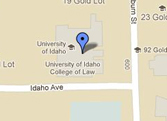College of Law
Moscow

uilaw@uidaho.edu
Administration Office: 208-885-2255
Dean’s Office: 208-885-4977
fax: 208-885-5709
Menard 101
711 S. Rayburn Drive
Mailing Address:
College of Law
University of Idaho
875 Perimeter Drive MS 2321
Moscow, ID 83844-2321
Boise
First Monday - September 8, 2009
In this issue:
- 2009 Entering Class Combines Strong Credentials with Varied Backgrounds
- Distinguished Judges and Lawyers Make Professionalism the Focus of “Day One” in Law School
- Trial Advocacy “Boot Camp” Features Remarkable Instructors from the Bench and Bar
- Idaho Women Lawyers Provide Mentoring for UI Law Students
2009 Entering Class Combines Strong Credentials with Varied Backgrounds.
Preliminary figures are in for the 2009 entering class of law students. (Final statistics will be compiled by the University after the 12th day of regularly scheduled classes across the campus, where classes begin later than law classes.) Based on data available on “opening day” at the College of Law, 114 first-year students have enrolled. They were selected from a pool of 743 applicants, down slightly from 759 in 2008. The number of applications received from Idaho resident applications dropped more substantially, from 203 to 177; this, in turn, contributed to a decline in the proportion of Idaho residents among enrolled students, from 68% in 2008 to 61% in 2009 (although this is still higher than 57% in 2006). Many of the nonresidents have personal or family connections to Idaho.
The entering UI class posted a median LSAT score of 155 – approximately the 64th national percentile -- compared to 154 (60th percentile) the previous year. The class possessed a median undergraduate GPA of 3.35, compared to last year’s 3.29. Of concern is the fact that women comprise just 33% of the entering class, compared to 41% last year. The reduced representation of women was attributable in part to a decline in the proportion of women applicants (reflecting a national trend) and in part to a relative decline in the enrollment yield among women offered admission. Diversity in the entering class, measured in terms of race and ethnicity, also declined from 18% to 12-15% (depending upon category definitions), reflecting another national trend in minority representation among law school applicants. These trends, and Idaho-specific circumstances, will be studied carefully by the College of Law.
When measured by the variety of backgrounds and perspectives, this year’s entering students comprise a diverse and interesting academic community. The students have come to the College of Law from 47 colleges and universities, compared to 38 last year. The Idaho public institutions represented in the entering class, in order of 1L enrollment, are the University of Idaho, Boise State University, Idaho State University, BYU-Idaho, the College of Idaho, and Lewis-Clark State College. Out-of-state institutions include Notre Dame, University of California/Berkeley, University of Virginia, Boston University, and Ohio State University.
Academic and geographical data, of course, do not capture the whole human dimension of an entering class. The admissions committee, composed of faculty members, looks at each “whole person” in making selections. The 2009 entering class is a notably cosmopolitan group. Collectively, the students have resided for various periods of time in 35 countries and they have acquired abilities to speak 20 different languages. The class includes an engineer, an anthropology professor, an environmental geologist, an insurance agent, a truck driver, members of the Armed Forces (Army, Army National Guard, Marine Corps, and Air Force), small business proprietors, a coal miner, interns for public officials in Boise and Washington, D.C., a professional actor, a musician, a dancer, a commercial fisherman, a school teacher, an accountant, a forest firefighter, a fly fishing guide, a prison mental health officer, a certified nursing assistant, a journalist, a computation biologist, and a professional basketball player!
These diverse backgrounds enhance the richness and quality of education at the College of Law, where students learn from each other as well as from the faculty. Further information about the incoming class and the admissions process is available from Jenifer Finney, our new Director of Admissions.
Distinguished Judges and Lawyers Make Professionalism the Focus of “Day One” in Law School
Among the “signatures” of the University of Idaho College of Law is a program entitled “Professionalism: First Day of Law School – Foundation of a Career,” which describes the theme of every incoming student’s introduction to the study of law. Now in its seventh year, the program is co-sponsored by the College of Law and the Idaho State Bar. The content of the program focuses on integrity and ethical conduct, with special emphasis on the importance of civility. The heart of the program is a carefully crafted series of intimate discussions in which groups of five to seven students meet with selected judges and lawyers to discuss scenarios that illustrate issues in professional responsibility. The issues include truthfulness and fairness in litigation, cooperation with fellow officers of the legal system, fiduciary obligations to clients, reasonableness of fees, conflicts of interest, the duties of lawyers vis-à-vis difficult or dishonest clients, and pro bono service.
On August 18, 2009, the program featured introductory remarks by the Hon. Daniel Eismann (UI Law ’76), Chief Justice of the Idaho Supreme Court, and closing remarks by the Hon. Karen Lansing, Chief Judge of the Idaho Court of Appeals. Later in the same day, the students heard from Newal Squyres (Holland & Hart, Boise), President of the Idaho State Bar, and Second District Judge John Stegner UI Law ’82). Chief Justice Eismann and Judge Lansing also participated in the small-group discussions along with following additional leaders of the Idaho judiciary and legal profession:
Idaho Supreme Court Justices Warren Jones and Joel Horton Joel D. Horton (UI Law ’85); Idaho Court of Appeals Judge Sergio Gutierrez; First District Judges John T. Mitchell (UI Law ’85) and Steven Verby (UI Law ’76); First District Magistrate Debra Heise; Second District Magistrate John Judge (UI Law ’84); Third District Magistrate Jerold Lee (UI Law ’95); Idaho Attorney General Assistant Chief Deputy Brian Kane and Deputy Attorney General Shasta Kilminster-Hadley; Deputy United States Attorney and Idaho State Bar Commissioner Deborah Ferguson; Nez Perce tribal attorneys Mike Lopez and Heidi Gudgel (UI Law ’89); Ada County deputy prosecutors Fafa Alidjani (UI Law ’98) and Jim Dickinson (UI Law ’77); Caralee Lambert and Julia Crossland, Idaho State Bar Office of Bar Counsel; Spokane attorney Mary Gianini (UI Law ’84); Coeur d’Alene attorneys Bill Boyd (UI Law ’65), April Linscott, Saviraj Grewal,and Peter Smith; Hayden attorney Lisa Holmes (UI Law ’91); Kellogg attorney Michael Peacock (UI Law ’78); Moscow attorney Anne Dwelle (UI Law ’88); Moscow attorney/public defender Sunil Ramalingam (UI Law ’97); Boise attorneys Bob Aldridge, Karen Gowland (UI Law ’84), Kim Toryanski, and John Zarian; Boise attorney/Idaho Court of Appeals law clerk Chris Chistensen (UI Law ’07); Nampa attorney Bud Yost (UI Law ’69); and Pocatello attorney and Idaho State Bar Commissioner Reed Larsen (UI Law ’85).n total, 37 judges and lawyers volunteered their time as mentors and speakers on the first day of the 2009 1L orientation program. The College is grateful to all of them for their volunteer service to legal education. Further information on the orientation/professionalism program is available from Dean Burnett (dburnett@uidaho.edu).
Trial Advocacy “Boot Camp” Features Remarkable Instructors from the Bench and Bar
In August, 2009, the College of Law marked the 31st anniversary of its annual “boot camp” trial advocacy program. The week-long intensive program, modeled after the National Institute for Trial Advocacy, provides students a once-in-a-lifetime opportunity to learn practical skills in courtroom advocacy from experienced faculty and widely known judges and practitioners. At the conclusion of the week-long session, the students test their skills by trying a case to live juries consisting of the new 1L students.
The program alternates yearly between criminal and civil cases. This year the focus was on criminal prosecution and defense. The program’s teaching corps included Professor Maureen Laflin, organizer of the program, and Clinical Professor Pat Costello. Teachers also included noteworthy members of the bench and bar:
Hon. N. Randy Smith, Judge of the United States Court of Appeals for the Ninth Circuit; Hon. Candy W. Dale (UI Law ’82), Magistrate of the United States District Court, District of Idaho; David Metcalf, staff attorney, chambers of the Hon. B. Lynn Winmill, Chief Judge, United States District Court, District of Idaho; Wendy Olson, Deputy United States Attorney, District of Idaho, and nominee to become Idaho’s next United States Attorney; Noel Larrivee, Montana attorney and instructor at the University of Montana, who has taught in all 31 years of the Idaho program; David Nevin (UI Law ’78), internationally known criminal defense lawyer, practicing in Boise; Richard Rubin, Executive Director of Federal Defender Services of Idaho; Teresa Hamilton, head of the capital habeas unit, Federal Defender Services of Idaho; Jamie Shropshire, Deputy City Attorney, Lewiston; and Jan Bennetts, Deputy Ada County Prosecutor.
The College thanks each of these unselfish judges and lawyers for making the “trial ad” program one of the distinctive elements of an Idaho legal education. Further information about the program is available from Professor Laflin (mlaflin@uidaho.edu).
Idaho Women Lawyers Provide Mentoring to UI Law Students
The College of Law enjoys, and is grateful for, an exceptionally close relationship with the bench and bar. In a new manifestation of this relationship, Idaho law students will have the opportunity, beginning this fall, to learn from experience -- and from experienced attorneys – as the Women’s Law Caucus, a student organization, partners with Idaho Women Lawyers, Inc., a professional non-profit organization, to provide on-the-job training and online mentoring.
"As women emerge more visibly in the legal field, it is important for them to have strong role models who have the experience of both being a woman and being an attorney in practice," said second second-year law student Allison Blackman, WLC co-president. "Idaho's women attorneys who are dedicated to sharing their experiences will provide an invaluable resource to current students.”
The program is open to students of both genders, pairing students with female attorneys throughout the state. (In fact, membership in WLC and the IWL is open to both men and women.) The intent is to provide students opportunities to ask questions about real-life experiences and to learn about current legal practices in the field. The program also provides networking opportunities for students, for practicing professionals and for participating College of Law faculty and staff.
Mentoring will include live and virtual elements: in addition to providing students the opportunity to shadow professional women lawyers as they work, the WLC and IWL will provide an Internet forum for easy communication between mentors and mentees. Throughout the semester, the online forum will be used to introduce formal topics for participants to discuss. The University of Idaho WLC also hopes to bring members of IWL to campus to speak to students.
Attorneys and University of Idaho students interested in participating in the program can contact Blackman at allisonblackman@vandals.uidaho.edu or Heather O'Leary, WLC co-president, at olea2395@vandals.uidaho.edu.


